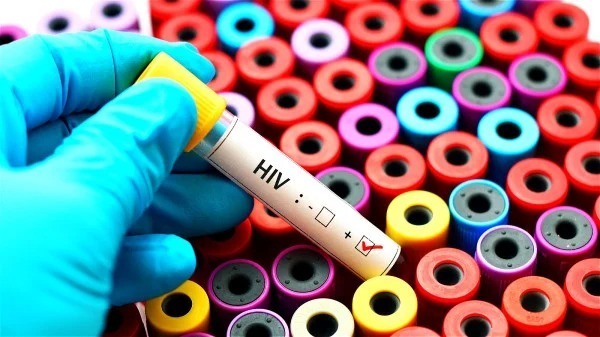The alarming AIDS situation in China came under the spotlight on Dec. 1, World AIDS Day. Currently, more than one million Chinese are living with HIV.
According to China’s national media, CCTV, by the end of 2020 China had more than 1 million people infected with HIV, with 351,000 cumulative deaths reported. Two groups with a high prevalence of HIV infection are currently raising concerns, young students and those aged 50 and older.
A white paper on HIV prevention and treatment among young people was recently released by China, showing that in 2020, nearly 3,000 new cases in young students aged 15-24 were reported nationwide, with sexual transmission accounting for 98.6 percent of cases, 81.7 percent due to male homosexual transmission and 16.9 percent due to heterosexual transmission.
The proportion of HIV-infected patients aged 50 years and older has increased significantly. Data from the China Center for AIDS Prevention and Control shows a doubling in 10 years, from 22 percent in 2011 to 44 percent in 2020. While comparing provinces where AIDS first emerged in China, data from 2020 showed that over 60 percent of Chinese provinces had patients aged 50 and older as the highest proportion of the infected.
On Nov. 29, the Beijing Municipal Health Commission announced that from January to October 2021, there were 1,654 new cases of HIV-infected individuals and patients now living in Beijing, an increase of 17.47 percent over the same period last year. There are currently 24,435 infected patients living in Beijing.
Success
You are now signed up for our newsletter
Success
Check your email to complete sign up
Recently, the Honorary Director-General of the World Health Organization (WHO) Margaret Chen Feng Fuzhen emphasized that in the past few years, about 3,000 new cases of HIV infection among young students aged 15-24 have been reported in China every year, primarily due to unprotected sex, and that young people have become the most critical population in China’s HIV prevention and control efforts.
Although Chinese authorities have reported the AIDS situation in China, the public has questioned the authenticity of its data. In an article titled “Wenlou Village” in Baidu’s encyclopedia, it’s mentioned that the village is one of the most densely populated areas in China in terms of the number of people infected with AIDS, with 70 percent of the village’s population either having AIDS or HIV carriers in their homes, and there are 38 villages of this kind throughout Henan Province.
Ms. Gao Yaojie’s legacy
Ms. Gao Yaojie, who is now 95 years old and is known as “the first person to prevent AIDS in China”, used to be a professor at Henan College of Traditional Chinese Medicine and an expert in gynecological oncology. In April 1996, she first came into contact with AIDS patients who were infected via blood transfusion, and in March 2000, she entered the AIDS villages and delivered medicines, supplies, leaflets, and books at her own expense.
She authored several books describing the tragic deaths of AIDS patients and exposing the ” economy of blood plasma” promoted by the Chinese Communist Party (CCP) that led to the massive spread of AIDS, which led to her suppression. She moved to New York in 2009.
Gao Yaojie once told The Epoch Times that her greatest wish was to “let everyone know that there are AIDS patients in China, and it would be great if we could help them.” She also said that she wanted to devote her life to preserving the history of AIDS in China. “The biggest problem with the Chinese Communist Party is that it lies and falsifies. The CCP wanted me to lie. (I) won’t go back even if I die.”
Gao Yaojie’s brother, Gao Shijie, who has always supported his sister’s good deeds, pointed to pictures of AIDS patients and said, “Those people, look at how rotten they get. They end up like skeletons in an anatomical chart. Everyone is like that. Their families are so poor that they don’t have anything. They don’t even have money to raise a chicken or a pig. I just wish now I could make more people understand the real situation because the radio [in China] is always saying this is good and that is good. It doesn’t report anything bad.”
The AIDS Prevention Office in Henan Province reported on Oct. 31, 2013, that “the province has a cumulative total of 59,000 people infected with AIDS.” In response, Gao Shijie said, “50,000? Even if the number is increased by 10 times, [the real number] is still much more than that. It’s quite serious [in Henan] where one village after another, a village of people is like this. Now they [the local government] have sealed up the village so that people from outside can’t get in and people from inside can’t get out, letting them perish on their own. They [the local government] are doing it.”
When it comes to the proliferation of AIDS in China, people would think of Henan province. But Gao Shijie revealed, “Actually, there are other provinces as well. My elder sister has been to provinces like Shanxi, Yunnan, and Guizhou. It’s everywhere.”
China Digital Times reports that Gao Yaojie is known as “the first Chinese civil AIDS prevention person.” She has received international awards including the Jonathan Mann World Health and Human Rights Award and the Global Women’s Leadership Award. She was named “Asian Hero” by Time Magazine, and “Asian Star” by Business Weekly. In 2007, the International Astronomical Union named the asteroid 38980 “Gao Yaojie.”














